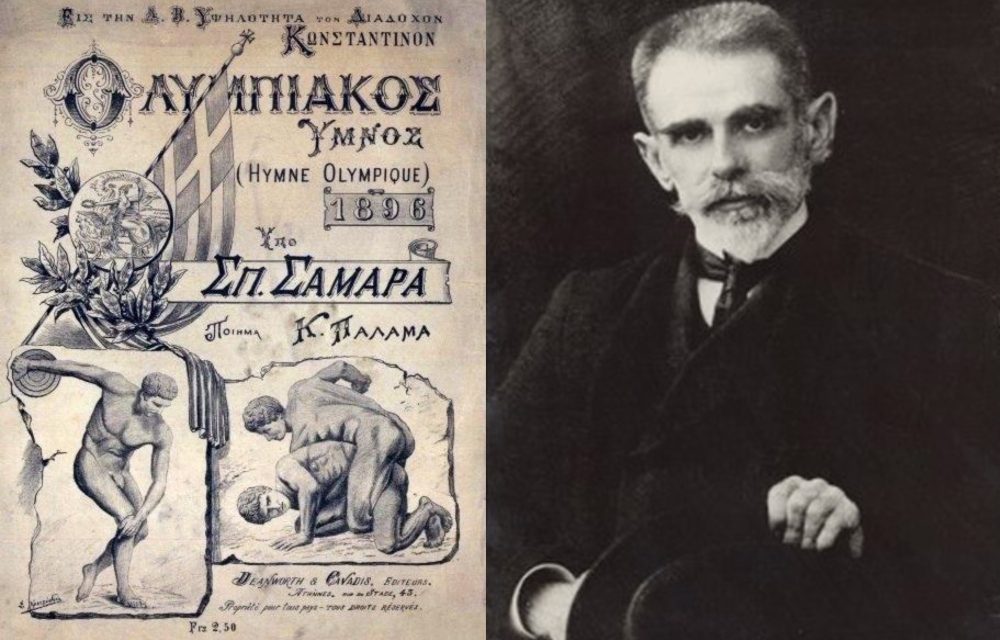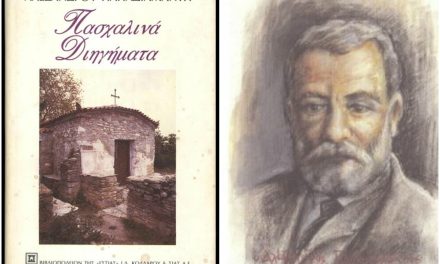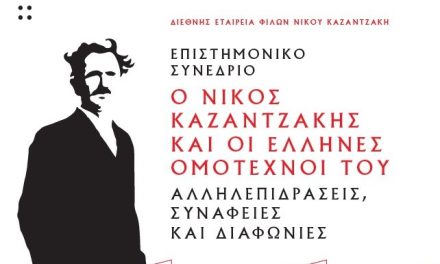The modern Olympics were established in the late 19th century, thanks to the efforts of a movement led by Pierre de Coubertin, founder of the International Olympic Committee, who wished to revive the practices and ideals of the ancient Olympic Games. The first Olympiad took place in 1896 in Athens; at the opening ceremony, held at the Panathenaic Stadium, a large choir performed the Olympic Hymn, composed Spyridon Samaras with lyrics by Kostis Palamas. In 1958, it was declared the official Olympic Anthem.
The modern Olympics
The idea for a modern Olympiad was introduced by Baron Pierre de Coubertin (1863-1937), a French aristocrat with studies in various subjects including history and education. An admirer of Ancient Greek culture, as well as a strong proponent of physical education, de Coubertin instigated the revival of the athletic competitions that took place every four years in Ancient Olympia. He reimagined it as international instead of PanHellenic, in the spirit of promoting the ideals of sportsmanship and fair play.
In his mission to promote these ideals, he contacted the Greek government and national benefactors Evangelos and Konstantinos Zappas, who were already working on spreading the spirit of athleticism in Greece. The modern Olympic movement was officially born in 1894, with the establishment of the International Olympic Committee. Demetrios Vikelas, a Greek businessman and writer, became its first President (he was succeeded by de Coubertin in 1896). The first Summer Olympics of modern history were set to take place in Athens, while Paris would host the second Olympic Games.
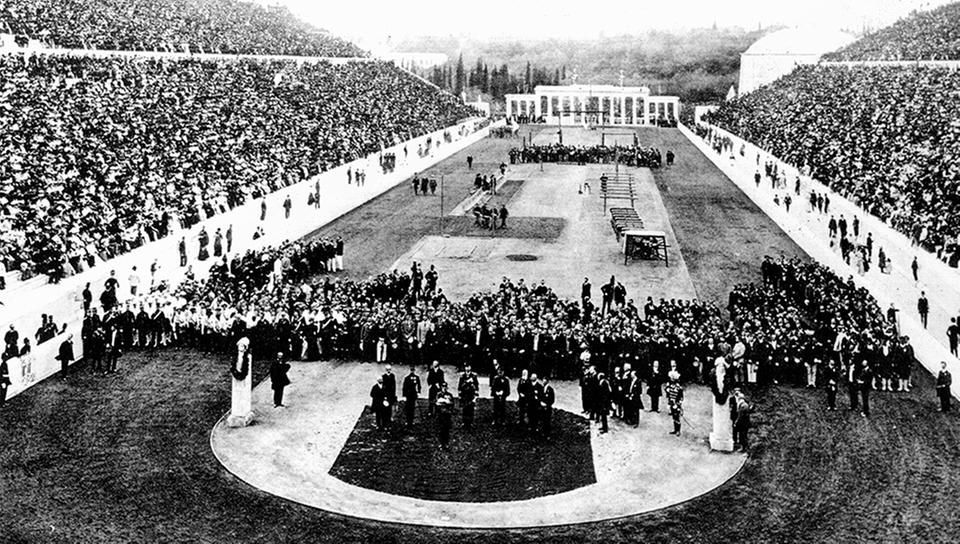 The opening ceremony of the 1896 Summer Olympics
The opening ceremony of the 1896 Summer Olympics
The history of the Anthem
Greece was unanimously chosen as the first Olympic host as the birthplace of the ancient games. Fourteen countries participated in these first games. The opening ceremony was held at the Panathenaic Stadium, which was also the main sports venue for the event, and nine bands and 150 choir singers performed The Olympic Hymn, which had been commissioned by the committee (and Vikelas in particular) to Greek composer Spyridon Samaras, on lyrics written by Greek poet Kostis Palamas.
Although the anthem had been ignored for the following decades, with each hosting country commissioning a new one for its own Olympiad, in 1958, at the 54th Session of the International Olympic Committee in Tokyo, it was declared the official anthem of the Games and the IOC. Samaras’s composition was performed at the 1960 Winter Olympics in Squaw Valley, USA, for the first time since 1896; an English version of the anthem was introduced, used to this day, with rewritten lyrics different to the original poem.
The hymn has since been performed at every Olympic event, usually at both the opening and closing ceremonies. Each country can choose between the English version, the Greek version, or a translation of the original Greek version to any language, or even an instrumental version. Often, more than one versions are used at the same Olympiad. The hymn has been sung in Greek (either as the only version, or along with versions in other languages) at the 1976 Summer and Winter Olympics, at the 1980 Summer Olympics, at the 1988 Winter Olympics, at the 2000 Summer Olympics, at the 2004 Summer Olympics (in Athens), at the 2008 Summer Olympics and at the 2018 Winter Olympics.
The Refugee Olympic Team (EOR) is also represented by the Olympic flag and the official Olympic anthem.
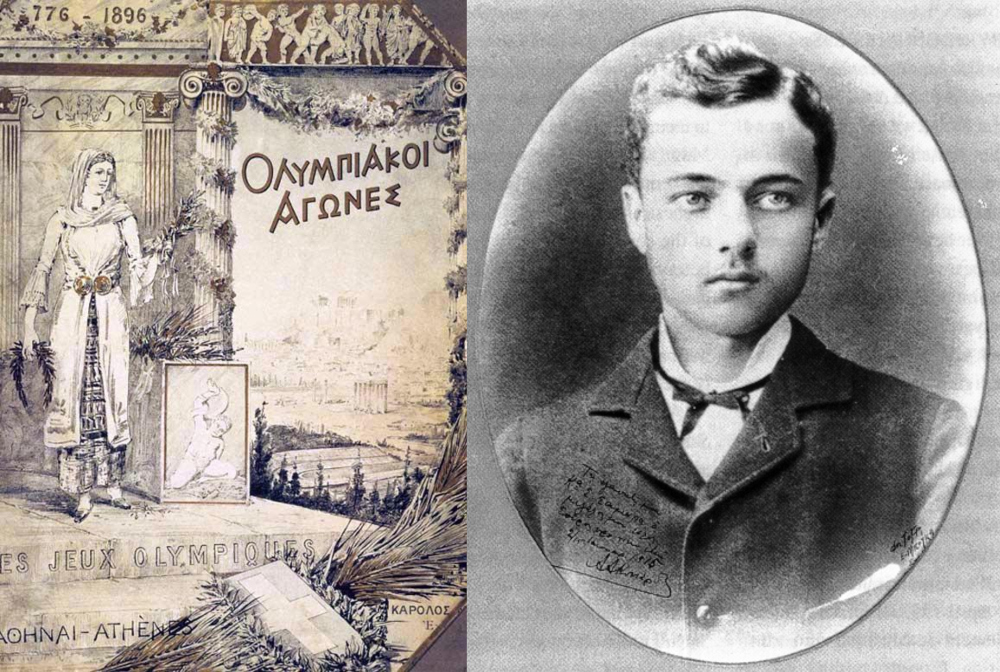 Left: Cover of the official report of 1896 Athens Summer Olympics; Right: Spyridon Samaras at a young age
Left: Cover of the official report of 1896 Athens Summer Olympics; Right: Spyridon Samaras at a young age
The Olympic Hymn*
Ancient immortal spirit, unsullied father
of that which beautiful, great an true,
descend, make thyself known and shine here
on this earth and below these skies, witness of thy glory.
Illuminate the endeavour wrought in noble contests,
in the running race, the wrestling and the throwing.
Place a wreath of evergreen branch,
creating the body as of iron and worthy.
Vales, mountains and oceans shine with thee
like unto a great temple of white and porphyry.
To which all peoples hasten to this temple
to worship thee, Oh ancient immortal spirit.
Kostis Palamas
Kostis Palamas (1859-1943) is considered by many to be Greece’s national poet. He was a key figure of the generation of the 1880s known as “the New Athenian School“. Born in the city of Patras, he lost both his parents at the age of six, and grew up with relatives in the historic town of Missolonghi. In 1875, he moved to Athens, were he would enroll at the School of Law at the Athens University. He would however soon give up his studies to focus on his writing. He published his poems in various periodicals, while he also worked as a journalist for large newspapers.
He issued his first collection of poems, Songs of my country, in 1886, followed by The eyes of my soul in 1892, while in 1889 he won a poetic competition with his long poem Hymn to Athena. This distinction drew the attention of Demetrios Vikelas, already an established author, who was deeply impressed by the poem and its hellenic themes.
Palamas was famous for advocating the use of Demotic Greek language (demotiki), that is, the vernacular Greek spoken at the time (almost identical to the language spoken in Greece today), as opposed to katharevusa, an artificial, purified language, based on the old classical norms, which was –after the establishment of the modern Greek state– used in all official domains, including also public education and literary production. His poems were believed to speak to the heart of the people, often touching on romantic or tragic themes but often also permeated by a spirit of national exuberance.
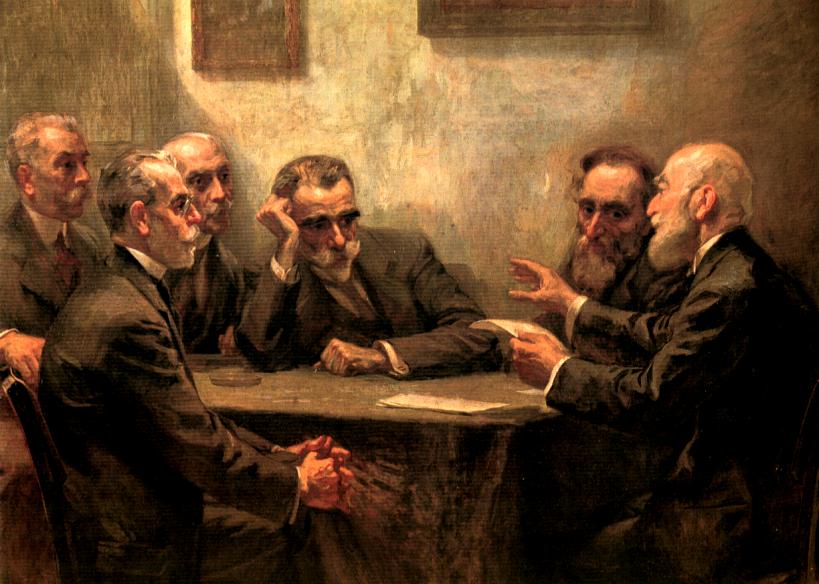 The Poets, by Georgios Roilos (Palamas is depicted in the middle, among other poets of the “New Athenian School” – via Wikimedia Commons)
The Poets, by Georgios Roilos (Palamas is depicted in the middle, among other poets of the “New Athenian School” – via Wikimedia Commons)
The poet wrote The Olympic Hymn in the spring of 1895, and it was then set to music by Spyridon (Spyros) Samaras – to whom Palamas would dedicate the Hymn for “giving it wings”. Samaras was one of the foremost representatives of the Second Generation of the “Ionian (or Heptanese) Scool of Music“. Born in Corfu in 1861, Samaras had graduated from the Paris Conservatoire, where he had studied under Romantic composers such as Jules Massenet and Léo Delibes; by the time he was commissioned the anthem, he had made a name for himself in France and Italy as an opera composer.
Palamas would go on to become one of Greece’s most popular and widely revered poets. His most acclaimed works include the poetry collections Iambs and Anapaests (1897), The Grave (1898), Life Immovable (1904), The Twelve Lays of the Gypsy (1907) and The King’s flute (1910). He also wrote a small number of short stories and translations, and several literary critiques, as well as Trisevgeni (1902), a drama in four parts. He died on 27 February 1943, and his funeral was attended by thousands of people despite Athens being under Nazi occupation at the time. Angelos Sikelianos (1884–1951), one of the most prominent Greek poets, recited an elegy for Palamas, naming him among the most iconic poets ever to come from Greece.
*Translation taken from the official IOC website
Read also via Greek News Agenda: The new Athens Olympic Museum; POEM OF THE MONTH: A tribute to Greek Poet Angelos Sikelianos; BOOK OF THE MONTH: “Slaves in their Chains” by Konstantinos Theotokis; Vasilis Michaelides: A Tribute to the National Poet of Cyprus; POEM OF THE MONTH: “The Greek language” by Nikiforos Vrettakos
Nefeli Mosaidi (Intro image: Left: Title page for the sheet music of The Olympic Hymn, 1896 [Source: Greek National Library]; Right: Kostis Palamas in 1912 [source: I Lexi Magazine, 1993])
TAGS: HISTORY | LITERATURE & BOOKS | SPORTS

